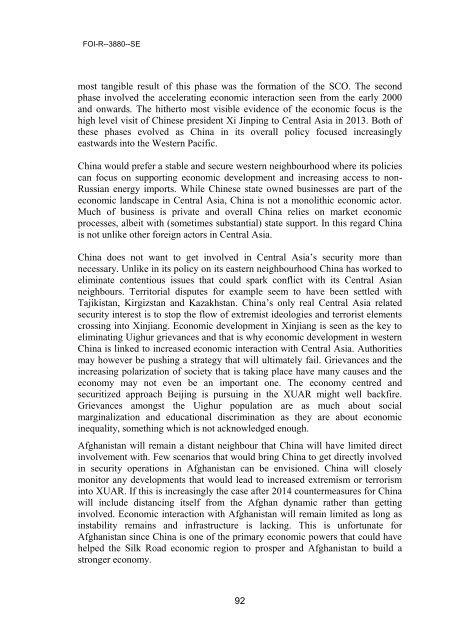foir_3880
foir_3880
foir_3880
You also want an ePaper? Increase the reach of your titles
YUMPU automatically turns print PDFs into web optimized ePapers that Google loves.
FOI-R--<strong>3880</strong>--SE<br />
most tangible result of this phase was the formation of the SCO. The second<br />
phase involved the accelerating economic interaction seen from the early 2000<br />
and onwards. The hitherto most visible evidence of the economic focus is the<br />
high level visit of Chinese president Xi Jinping to Central Asia in 2013. Both of<br />
these phases evolved as China in its overall policy focused increasingly<br />
eastwards into the Western Pacific.<br />
China would prefer a stable and secure western neighbourhood where its policies<br />
can focus on supporting economic development and increasing access to non-<br />
Russian energy imports. While Chinese state owned businesses are part of the<br />
economic landscape in Central Asia, China is not a monolithic economic actor.<br />
Much of business is private and overall China relies on market economic<br />
processes, albeit with (sometimes substantial) state support. In this regard China<br />
is not unlike other foreign actors in Central Asia.<br />
China does not want to get involved in Central Asia’s security more than<br />
necessary. Unlike in its policy on its eastern neighbourhood China has worked to<br />
eliminate contentious issues that could spark conflict with its Central Asian<br />
neighbours. Territorial disputes for example seem to have been settled with<br />
Tajikistan, Kirgizstan and Kazakhstan. China’s only real Central Asia related<br />
security interest is to stop the flow of extremist ideologies and terrorist elements<br />
crossing into Xinjiang. Economic development in Xinjiang is seen as the key to<br />
eliminating Uighur grievances and that is why economic development in western<br />
China is linked to increased economic interaction with Central Asia. Authorities<br />
may however be pushing a strategy that will ultimately fail. Grievances and the<br />
increasing polarization of society that is taking place have many causes and the<br />
economy may not even be an important one. The economy centred and<br />
securitized approach Beijing is pursuing in the XUAR might well backfire.<br />
Grievances amongst the Uighur population are as much about social<br />
marginalization and educational discrimination as they are about economic<br />
inequality, something which is not acknowledged enough.<br />
Afghanistan will remain a distant neighbour that China will have limited direct<br />
involvement with. Few scenarios that would bring China to get directly involved<br />
in security operations in Afghanistan can be envisioned. China will closely<br />
monitor any developments that would lead to increased extremism or terrorism<br />
into XUAR. If this is increasingly the case after 2014 countermeasures for China<br />
will include distancing itself from the Afghan dynamic rather than getting<br />
involved. Economic interaction with Afghanistan will remain limited as long as<br />
instability remains and infrastructure is lacking. This is unfortunate for<br />
Afghanistan since China is one of the primary economic powers that could have<br />
helped the Silk Road economic region to prosper and Afghanistan to build a<br />
stronger economy.<br />
92


